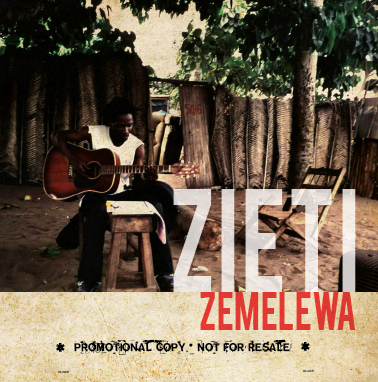Zemelewa, the new release from the group Zieti, blends styles to create an intriguing dynamic. Led by singers Tiende Laurent and Yeoue Narcisse from Cote d’Ivoire, the band also features musicians from the USA, Ghana and Cameroon. The songs are sung in the local Guere language as well as French. Accordian, flute, harmonica, and brass band fills add a variety and cosmopolitan feel to the record. While the vocals were recorded in Cote d’Ivoire, the other elements were added separately in the United States to create an impressive final mixing project.
The production history of Zemelewa and of the band Zieti is very unusual and perhaps is reflected in the nature of the music itself: They formed in 1997 as a collaboration between American musicians Shereikis and drummer Alex Owre with Laurent and Narcisse in the Ivory Coast. When the Americans left the country in 1999, the band fizzled. However, in 2005 Laurent and Narcisse managed to get a recording out entitled Terroir via a local studio. The album wasn’t successful, but the tracks were sent to Shereikis back in the States, who reduced it down to its basic components. Shereikis proceeded to built it up again piece by piece using his many musical connections, including the brass band as well as Atta Ado on percussion from Ghana and Cameroonian bassist Aristide Zogdoule. The present recording, Zemelewa, is the final product of all those separate recording sessions.
The unique recording process makes for an array of various styles and sounds on Zemelewa that surprisingly fits together. Take the easy "Tindehe" that offers a tropical breeze-like melody from the guitar as a singer calls for an African cultural revival. His relaxed voice is supported by a chorus of backup singers. After the singing, the guitar again occupies center stage, taking a lush solo. Here is a translated section of the lyrics: "Yet we all know the birds never forget its nest / We are the warriors for the future of our culture/ and we amplify your legacy / Here are your warriors / Bless them so that our ambassador, the drum, may live on."
The next song,"Tche," continues the calm contemplative mood beginning with just an accordion playing extended chords. The vocals are very plain and conversation-like. Once again, other singers join and harmonize with the main lyricist. The melancholy mood is fitting for the subject – a love song for a woman who has left this world. This song blend smoothly into "Patriote," trading in the accordion for a sultry saxophone. The song acts as a call and prayer for Ivorians to return to their country to help rebuild. The singers repeat like an echo the phrase (translated) “Let us bathe in the holy waters of God and receive his blessing.” These types of religious themes extends throughout the record. The father of singer-songwriter Tiende Laurent was an important social and religious leader in his community. While Laurent did not follow in his footsteps, he has that background in folklore and religion, which shows in the religious spirit present in even the most political songs. On “Djemin,” the accordion returns, creating a zydeco or gypsy-jazz feel. It is a surprise to hear that the light, playful song, that includes dialogue and laughing, actually describes prostitution in Adjamé, a neighborhood in the Ivorian capital Abidjan. Warning of the dangers of HIV/AIDS, the message is very direct: “Have you seen it already?/ Good time girls for only 300/Youth, men, let us fight this together.”
Elsewhere the album explores different musical territories. “Bah Bohi” takes the singing up a register, creating a pop feel with soft guitar in the background, a setup reminiscent of Paul Simon. The song asks parents to take responsibility for their children. Laurent and Narcisse write their lyrics with a strong social consciousness, constantly calling for change in their society. The message here is bolstered by soulful runs on the organ that slip in and out behind the vocals. Apart from the singing in Guere and the constant presence of the drums, the album has a very Western feel.
“SIDI" delves into yet another side if the band, beginning with a brief intro by the Chopteeth Afrofunk Big Band. The group was recruited by Zieti guitarist and main producer Michael Shereikis. This song underscores the HIV/AIDS focus. Despite the many musicians and instruments involved, the song as well as the rest of the album has a mellow controlled feel. The volume never rises to fever pitch. Despite this, the excellent compositional structure of the tunes creates momentum and holds the listener’s attention. “Mandedi”continues in the vein of “SIDI,” taking off with an extended brass band melody, harmonizing with a bouncy pep-band vibe. Here the band moves furthest away from its West African drumming and vocal harmony roots.
The most recent update on the Zieti Blog tells that the producers have contacted Laurent for the first time in many months after violence in his area had left them unable to reach him and unsure as to his personal safety. The contact was achieved through a friend physically traveling to Laurent’s town in the rural western part of the country. Laurent apparently was alive but suffering from burns from a recent slash-and-burn agricultural field management project gone wrong. Supposedly the friend told Laurent about the progress of the Zieti album release, and he was “elated with the news”. However, with bigger problems on Laurent’s plate, and with the difficulties in communication between Shereikis and the songwriters in Cote d’Ivoire, one begins to suspect that this album has greatly departed from its origins in the Ivory Coast and become something altogether different. Check it out and decide for yourself.









